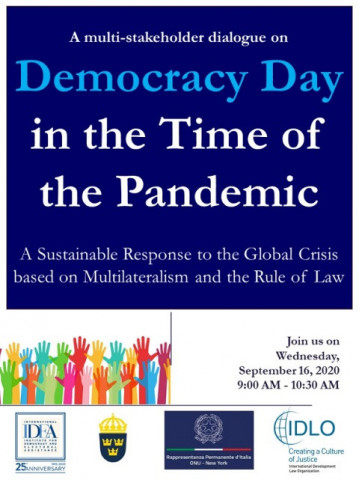
GCED Basic Search Form
Quick Search
Вы здесь
Events

The international community is observing the International Day of Democracy at a time when the magnitude, implications and gravity of the global crisis brought about by the pandemic are becoming increasingly patent. But so are also the lessons we are learning from current experience that can guide the recovery and serve, in the words of the UN Secretary General, to “build back better”. A central element of these lessons is that the quality and sustainability of the recovery will depend to a very large extent on governance capacity at all levels—local, national and international; on the transparency and accountability of public institutions; and on strengthening people’s trust in the state.
Across the globe, the pandemic has exposed entrenched inequalities and the state of insecurity in which large segments of the population, including in particular women and girls, are living, and has in fact contributed to further aggravating these conditions with an especially devastating impact on the most vulnerable. All aspects of society’s life and livelihoods, from healthcare and other social services to information integrity, have been profoundly affected.
Political dimensions and dynamics have been at the core of the response and will have a central place in the recovery. International IDEA’s online resources on COVID-19 and Democracy, and in particular its Global Monitor on COVID-19’s Impact on Democracy and Human Rights, show that at least 70 countries and territories across the globe have decided to postpone national and subnational elections due to COVID-19, out of which at least 33 countries and territories have decided to postpone national elections and referendums. The pandemic has triggered several exceptional legal/constitutional responses from governments around the world as they seek extraordinary measures to manage the threat, at times impacting on human rights and the integrity of democratic processes. A recent report, Global Democracy and COVID-19: Upgrading International Support, provides recommendations for policymakers and civil society to counteract the negative impacts of COVID-19 on democracy, including the need to strengthen state capacities and the role of formal institutions in democratic processes; to support new civic initiatives that are emerging as a result of the pandemic; and to put a special emphasis, within the post-pandemic development agenda, on strategic planning and inclusive analysis of experiences, in order to build preparedness of all countries across the world.
Justice and inclusion, in the spirit of Agenda 2030 and particularly SDG16, will need to be central elements of the recovery effort. The rule of law, as an instrument to operationalize human rights and an enabler to sustain in a mutually reinforcing way peace and socio-economic progress, provides a concrete pathway for governance in managing the crisis and its aftermath, and for orienting the drive towards the “peaceful, just and inclusive societies” that SDG16 calls for. A recently issued IDLO Policy Brief on The Rule of Law and COVID-19 highlights three key elements—enabling legal frameworks, mitigating impact, and continued investment in a culture of justice—essential for a rule of law-based response to the pandemic. It recommends priority actions focusing on the protection of the most vulnerable in managing the immediate consequences of the crisis and moving towards an effective, sustainable recovery.
Like all other parts of public life, the administration of justice and access to legal remedies and dispute resolution have been severely disrupted by the pandemic. The capacities of legal systems even in the most developed countries have been affected, with courts in some places slowing their ability to process cases or even shutting down. Countries and communities around the world in situations of conflict or fragility are particularly vulnerable to the social stresses being brought by the pandemic and must be supported to develop stronger governance systems including justice sector institutions through locally owned and context specific interventions.
Democracy and the rule of law are mutually reinforcing bases on which to anchor effective response and recovery efforts. Civic space must be protected since civil society organizations are not only partners in basic service delivery. They are also crucial actors for democratic accountability. The critical importance of SDG16+ and the inter-linkages between peace, justice, and effective institutions, particularly in a democratic governance perspective, are basic entry points for meeting the interrelated social, economic and environmental challenges posed by COVID-19.
PARTNER ORGANIZATIONS/COLLABORATORS:
International IDEA, International Development Law Organization (IDLO), and the Permanent Missions of Italy and Sweden to the United Nations
RSVP/CONTACTS:
Please fill out the registration form to receive the WebEx link to access the event.
For any further inquiries, kindly email Ms. Amanda Sourek at a.sourek@idea.int
URL:
